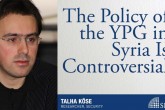Last week, the Ministry of Finance released a list of the 100 top taxpayers in Turkey, popularly known as the “tax record-holders.” As usual, it indicated that the country was grateful to them for being hard-working, fast-earning and law-abiding citizens. Not surprisingly, the majority of those 100 affluent and law-abiding individuals – and the corporate bodies they represent – came from the ranks of Istanbul-based, pro-Western, oligopolistic family conglomerates organized around the Turkish Industrialists and Businessmen’s Association (TÜSİAD).So, there are critical questions begging for a convincing reply in view of the current state of “state-business relations” in Turkey. Shall we all be grateful to the so-called “White Turks” for making lucrative gains over the course of Turkey’s global economic integration and paying considerable amounts of tax to the state in return? Shall we adopt a deeper perspective and look at the (lack of) transformation among Turkey’s main entrepreneurial classes despite dramatic waves of political and economic transformation that the country has gone through? Finally, how should we assess Turkey’s taxation policies given the fact that someone who pays an annual tax of around $1 million (TL 2.08 million) could easily get included in the top 100 list in a country whose GDP is approaching $1 trillion?
The fact that Justice and Development Party (AK Party) governments followed market-augmenting economic policies, which prioritized sustainable growth and did not systematically differentiate between domestic and international investors, facilitating capital accumulation by Turkey’s entrenched large-scale bourgeoisie who frequently formed comprador-like relationships with foreign capital. Major family-owned conglomerates such as the Koç, Sabancı, Eczacıbaşı, Boyner and Dinçkök groups leading the pack in TÜSİAD, as well as their allies in the business world, closely watched Turkey’s diplomatic and economic openings toward the Middle East and North Africa (MENA), sub-Saharan Africa, Latin America and East Asia without showing any supportive commitment or taking risks. Moreover, when AK Party governments tried to push for the improvement of local research and development (R&D) capacity by doubling the incentives given to the private sector and increasing tax breaks by up to 225 percent, technology companies largely owned by these groups were adept in using legal loopholes and absorbing the incentives to meet their personnel, construction or even cleaning needs.
As there was little corporate commitment to seek global competitiveness against American, British, German, Japanese or French multinational corporations, the ageold habits of maintaining a more downgraded position as regional agents, minority partners and licensed suppliers of global brands continued. When the government realized that most of the R&D support schemes had been abused and ongoing research was not turned into patent production, it radically changed incentive regulations. Not surprisingly, the following explosion in patent applications stemmed from the large companies owned by TÜSİAD members who did not hesitate to use public funds received as R&D incentives for foreign exchange speculation during volatile periods.
Looking at the top taxpayers in Turkey, one wonders whether the White Turks, who frequently complain about the slow pace of political and economic reform in Turkey, would initiate a reform in the national tax regime that favors their speedy capital accumulation. Currently, the tax burden (including social security premiums) in Turkey stands at 27.7 percent of GDP, which is comparatively lower than the OECD average of 34.5 percent. Moreover, the relative proportion of direct taxes at 13.6 percent of GDP is also striking compared to 20.8 percent in the OECD. As a result of the narrow tax base and low level of direct taxation, indirect taxes account for 45 percent of all tax revenues including social security premiums, which is well above the OECD averag


